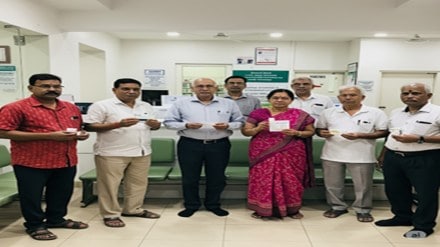The Centre has initiated several major reforms in the Central Government Health Scheme (CGHS) over the last few years, enhancing healthcare facilities for lakhs of central employees and pensioners. These reforms are aimed at ensuring timely availability of medicines to CGHS beneficiaries, especially senior citizens, and making health services more accessible and transparent.
What is CGHS and who are its beneficiaries?
The Central Government Health Scheme (CGHS) is a comprehensive healthcare system run by the Ministry of Health and Family Welfare, which provides medical facilities to current and retired employees of the Central Government, Members of Parliament, some members of the judiciary and personnel of some approved autonomous bodies. CGHS Wellness Centers are functioning in major cities of the country, where OPD consultation, medicines, diagnostic services and referral facility are provided.
Recently, a query was raised in Parliament around certain issues with CGHS facilities. MP Jaiprakash in the Lok Sabha sought to know from the government if there were any representations from the CGHS beneficiaries with regard to inordinate delay by the CGHS wellness centres in procuring medicines causing problems to the beneficiaries especially senior citizens.
In response to the question, Minister of State for Health Prataprao Jadhav said that the government has taken seriously the delay in the supply of medicines to CGHS Wellness Centres and several steps have been taken to address it.
What was the problem regarding the supply of medicines in CGHS Wellness Centres?
The government acknowledged that there were complaints from CGHS beneficiaries, especially senior citizens, that there was a lot of delay in the supply of medicines in the wellness centers, due to which they were facing problems. Based on these complaints, the Ministry of Health has developed a digital solution.
What steps did the government take?
The government informed that now a new software application developed by C-DAC has been implemented to monitor the demand, purchase and supply of medicines in CGHS Wellness Centers. This application tracks the demand trend and brings transparency in the supply of medicines as well as speeds up the process.
What is the new timeline for drug supply?
Routine medicines: These are ordered through CGHS Medical Store Depot (MSD). Jan Aushadhi medicines are procured separately from PM Jan Aushadhi Kendras. Each wellness centre compiles the monthly demand and sends it to its respective AD zone.
Supply schedule for Delhi-NCR: Here, medicines are supplied to CGHS wellness centres once every 35 days.
Restricted medicines: These medicines are procured on a case-to-case basis on the prescription of a specialist doctor. In Delhi, these are directly given to the beneficiary from MSD on the next working day, while in NCR these medicines are delivered within 3-4 working days through designated nodal wellness centres.
Role of local chemist: If a medicine is not available at the wellness centre, it is mandatory to deliver it to the beneficiary within 48 hours through a local authorised chemist. In case of delay, a penalty is imposed.
What other initiatives has the government taken in the last one year?
According to reports published earlier in Financial Express, several major changes have been made in CGHS in the last one year:
The list of private hospitals on the CGHS panel has been expanded to provide more choices to beneficiaries.
Digital health cards have made documentation easier for CGHS beneficiaries to avail treatment.
Based on suggestions from beneficiaries, work has been done towards bringing transparency and timeliness in CGHS rates and processes.
Tele-consultation services have also been expanded so that senior citizens can get consultation from the comfort of their homes.
